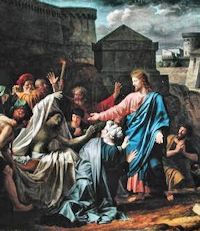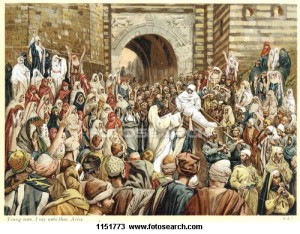“When the Lord saw her, he was moved with pity for her and said to her, ‘Do not weep.’”(Luke 7:13)
Vulnerable, destitute, defenseless—the situation of a widow in ancient times could be heartbreaking. Without a husband to protect and provide for her, a widow faced danger and poverty. This is why throughout the Hebrew Scriptures, God reminded his people to go out of their way to look after widows. A widow’s great comfort, of course, was a son if she had one. Filling the role of provider and protector in the place of his father, a son could guarantee safety and security. But what would happen if a widow’s only son died?
We meet two such widows in today’s readings. Staying in the house of a widow, Elijah begged God to bring life back to her son. And in the Gospel reading, Jesus interrupted a funeral procession to bring a young man back to life and give him back to his widowed mother. The reaction after each miracle was enthusiastic and hopeful: surely God was with his people! He had come to help the weakest and most vulnerable!
Whether or not we are widows, these readings tell us something important about God. Have you ever felt vulnerable or defenseless? Have you ever felt powerless in the face of circumstances outside your control? God cares! He who raised up the widow and orphan cares for you! He looks on you with compassion and says, “Do not weep” (Luke 7:13) .
God’s heart is moved when he sees you in a difficult situation. In fact, when you can’t rely on your own powers or abilities, he can draw you even closer to his side. So let God care for you today. Let him into the situations where you feel the least in control: an illness, a job loss, the challenge of starting over after the loss of a spouse or child. Ask your Father to walk with you, put his arm around you, and take care of you.
“Lord, in my vulnerability, I ask you to come close to me and show me your love. I trust in your protection!”
1 Kings 17:17-24; Psalm 30:2, 4-6, 11-13; Galatians 1:11-19
Questions for Reflection or Group Discussion
1. In the first reading, we see the great compassion the prophet Elijah had for the widow from Zarapeth, with whom he was staying. We also see the power of his prayers of intercession, which resulted in the widow’s son being restored to life. How strong is your confidence and trust in the Lord when you pray for others with serious needs? What are the obstacles that keep you from interceding for others with an expectant faith that the Lord will hear and answer your prayer in some way? What steps can you take to overcome them?
2. The responsorial psalm is a heartfelt psalm of praise and thanksgiving which ends with these words: “You changed my mourning into dancing. O Lord, my God, forever will I give you thanks.” In what areas of your life would you like to give thanks to the Lord for changing your “mourning into dancing”?
3. In the second reading, Paul says that his understanding of the truths of the Gospel did not come about by just personal study or rote acceptance of doctrines, but “through revelation of Jesus Christ.” What about you? In what way is your faith based on an interior revelation that Jesus Christ is who he says he, that is, your Lord and Savior, who died on the Cross for your sins?
4. In the Gospel, Jesus, moved with pity, raises a widow’s son from the dead (as did Elijah in the first reading). Notice the reaction from the crowd of people who witnessed this miraculous event. “Fear seized them all, and they glorified God, exclaiming, ‘A great prophet has arisen in our midst, and ‘God has visited his people.’” What is your reaction when you read the Gospel accounts of Jesus raising various people from the dead? Does it give you great confidence and faith that one day you will be raised from the dead, and you too will glorify God? If not. why not?
5. What is your reaction to these words from the meditation: “God’s heart is moved when he sees you in a difficult situation. In fact, when you can’t rely on your own powers or abilities, he can draw you even closer to his side.” Do you believe theses words apply to you right now? Why or why not? What about the words at the end of the meditation? “Ask your Father to walk with you, put his arm around you, and take care of you.”
6. Take some time now to pray and ask your heavenly Father to deepen your knowledge and experience of his great love for you. Use the prayer at the end of the meditation as a starting point.











